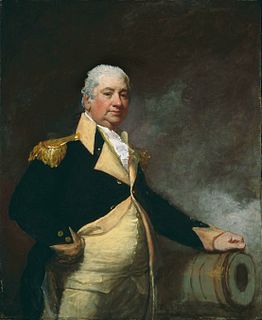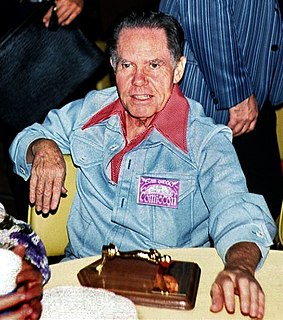A Quote by James Madison
With respect to the words "general welfare," I have always regarded them as qualified by the detail of powers connected with them. To take them in a literal and unlimited sense would be a metamorphosis of the Constitution into a character which there is a host of proofs was not contemplated by its creators.
Related Quotes
To refer the power in question to the clause "to provide for the common defense and general welfare" would be contrary to the established and consistent rules of interpretation, as rendering the special and careful enumeration of powers which follow the clause nugatory and improper. Such a view of the Constitution would have the effect of giving to Congress a general power of legislation instead of the defined and limited one hitherto understood to belong to them, the terms "common defense and general welfare" embracing every object and act within the purview of a legislative trust.
When, in the course of human events, it becomes necessary for one people to dissolve the political bands which have connected them with another, and to assume among the powers of the earth the separate and equal station to which the laws of nature and of nature's God entitle them, a decent respect to the opinions of mankind requires that they should declare the causes which impel them to the separation.
In matters of religion, I have considered that its free exercise is placed by the Constitution independent of the powers of the general government. I have therefore undertaken on no occasion to prescribe the religious exercises suited to it; but have left them as the Constitution found them, under the direction and discipline of State or Church authorities acknowledged by the several religious societies.
Our tenet ever was . . . that Congress had not unlimited powers to provide for the general welfare, but were restrained to those specifically enumerated; and that, as it was never meant that they should provide for that welfare but by the exercise of the enumerated powers, so it could not have been meant they should raise money for purposes which the enumeration did not place under their action.
Thomas Jefferson explained, Congress has not unlimited powers to provide for the general welfare, but only those specifically enumerated. .. If Congress can determine what constitutes the general welfare and can appropriate money for its advancement, where is the limitation to carrying into execution whatever can be effected by money?.
It would reduce the whole instrument to a single phrase, that of instituting a Congress with power to do whatever would be for the good of the United States; and as they would be the sole judges of the good or evil, it would be also a power to do whatever evil they please . . . . Certainly no such universal power was meant to be given them. It [the Constitution] was intended to lace them up straightly within the enumerated powers and those without which, as means, these powers could not be carried into effect.
I, sir, have always conceived - I believe those who proposed the constitution conceived,and it is still more fully known, and more material to observe, those who ratified the constitution conceived, that this is not an indefinite government deriving its powers from the general terms prefixed to the specified powers - but, a limited government tied down to the specified powers, which explain and define the general terms.
To compel a man to furnish contributions of money for the propagation of opinions which he disbelieves and abhors is sinful and tyrannical...A wise and frugal government...shall not take from the mouth of labor the bread it has earned...Congress has not unlimited powers to provide for the general welfare but only those specifically enumerated...Would it not be better to simplify the system of taxation rather than to spread it over such a variety of subjects and pass through so many new hands?
I want you to understand the words. I want you taste the words. I want you to love the words. Because the words are important. But they're only words. You leave them on the paper and you take the thoughts and put them into your mind and then you as an actor recreate them, as if the thoughts had suddenly occurred to you.


























